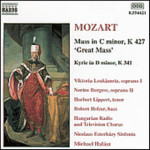
Mass In C Minor / Kyrie In D Minor
 $25.00
Out of Stock
$25.00
Out of Stock6+ weeks add to cart
W.A. MOZART
Mass In C Minor / Kyrie In D Minor
Norine Burgess (soprano) Robert Holzer (bass-baritone) / Nicolaus Esterhazy Sinfonia / Michael Halasz
[ Naxos / CD ]
Release Date: Sunday 18 November 2007
This item is currently out of stock. It may take 6 or more weeks to obtain from when you place your order as this is a specialist product.
Wolfgang Amadeus Mozart was born in Salzburg in 1756, the son of the violinist and composer Leopold Mozart, a musician employed by the ruling Archbishop.
It was his father who superintended his education and his early career as a child prodigy, made much of in the major cities of Europe. Adolescence brought employment in Salzburg, latterly under an unsympathetic patron, but attempts to find a suitable position elsewhere, whether in Mannheim or in Paris, came to nothing. In 1781, after success at the court in Munich with his newly commissioned opera Idomeneo, Mozart was summoned by the Archbishop to join his entourage in Vienna and it was there that he secured his dismissal. The last ten years of his life were spent largely in Vienna, without a patron or the necessary guidance of his careful father, but now with a wife who had brought him no dowry. Initial success was followed by a period of severe financial difficulty, although by 1791 it seemed that matters might take a turn for the better. Anything of this kind was brought to an abrupt end by his sudden death in December of that year.
In a letter of 4th January 1783 to his father in Salzburg, Mozart refers to a reproach from his father in a letter now lost, referring to moral obligation, presumably to his father, to whom he had neglected to send New Year greetings, as would have been expected. He had married Constanze Weber without his father's approval a year earlier and it was only during the summer of 1783 that he planned to take his wife to Salzburg to introduce her to his father and sister. In the same letter he refers to the coming fulfillment of a promise and to the score of half a Mass waiting to be finished, and it seems that this must be the Mass in C minor, K 427. The nature of the promise is not clear, but it may be presumed that the new composition was, in part at least, in thanksgiving for Constanze's recovery from illness, his marriage or the birth of their first child.
Tracks:
Mass No. 18 in C minor, K. 427, "Great"
Kyrie in D minor, K. 341



